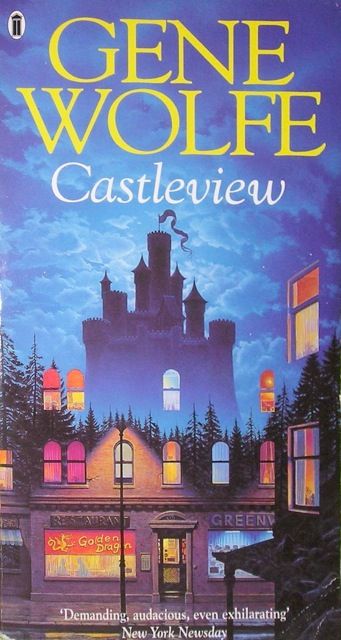ISBN: 9780450562549
Date read: 29/11/2021
How strongly I recommend it: 8/10
Support your local bookshop by going to Bookshop.org to buy your copy (instead of THAT online shopping website…)
‘ “I’ve been wondering why this town’s called Castleview.”
Mrs. Howard glanced toward a kitchen window. It was quick, no more than a flicker of her eyes; yet Sheilds felt sure he had seen fear.
Joy stepped in. “It’s really quite romantic. They say you can see a castle in the distance, sometimes, just at sunset. I have to admit I’ve never seen it, and I’ve lived here seventeen years plus. But lots of people have, or say they have. It’s an illusion, not a hallucination- few people have taken pictures, although they don’t usually turn out very well.”
“We’re looking east here, aren’t we?” Shields asked. He crossed to the window.
Tonelessly, Mrs Howard said, “That’s right.”
“Technically, they call it a Fata Morgana,” Joy told him. “Heaven only knows what that means, but my kids had to study it in school.”
“It means ‘Morgan the Fairy,’” Shields explained absently. “Morgan le Fay.” He was staring out at the rain.‘[1]
Castleview, Illinois is an ordinary American town. Less than a hundred miles from Chicago, it has all the usual amenities: a Chinese restaurant, a summer camp and a car dealership. It also has a peculiar phenomenon; sometimes, on a clear day, a gigantic medieval castle seems to appear on the eastern horizon.
‘ “That’s the good thing about a night like this. It doesn’t have to be after one. You might see it any time. They come in a lot closer in weather like this, right? They think we won’t see them.”
“Who comes in closer?”
“The people in the castle. There have to be people, right? It figures. They’re watching us.”
“Why should people in a castle watch this one little town?”
“How should I know?” For an instant Seth seemed irritated, then he laughed. “If we meet some we’ll ask them okay? Maybe there’s a weak spot right here where they can sneak through. Or maybe this reminds them of someplace else.” ‘[2]
Will Shields has just become the new owner of Castleview’s aforementioned car showroom, bringing with him his cookbook-writing wife Ann and their teenage daughter, Mercedes. They have bought their new house from the Howards, the patriarch of which, Tom Howard, has mysteriously and quite inexplicably died while at work in a loading dock. This tragic incident sparks the beginning of a number of events across Castleview:
Ann nearly crashes into a giant black horseman, whose horse she could have sworn had a few too many legs.
Mercedes picks up a hitchhiker, a medieval maiden in white who appeared to be thumbing for a ride at the side of the road.
Mrs Howard has an unusual visitor offering to buy her already-sold house. And who has a habit of magically vanishing and reappearing.
Anyone familiar with the writings of Sir Thomas Malory, who Wolfe quotes to open the book, will be right at home here, and will recognize quicker than most readers that, for some unknown reason, Arthurian legends seem to be coming to life and descending on Castleview. Soon Sheilds’ and his family, along with the Howards and the residents of the local summer camp, are set on a collision course with the creatures of medieval fantasy, through one reality-warping night in a sleepy Midwestern that none of them will forget. Or even survive.
This gem of a novel is slightly different from the more famous of Wolfe’s work. As the story is told from a third-person perspective, instead of one of Wolfe’s characteristic unreliable first-person narrators, we get Wolfe himself and instead of narrative deception, we get omission, which serves to build the mystery and intrigue of the story. It might not be to everyone’s taste; where lesser fantasy stories would front-load themselves with narrating every sword swing and gory death of a battle scene, Wolfe emits the scene altogether. What we get instead is the big action and plot taking place unseen by us the reader and what we are left with are the characters’ reportage and recounting of it. Personally, I find this an incredibly inventive way of telling a story, and like some of the best fiction, invites the reader to become a collaborator with the author in piecing together and deciphering the story.
In his inimitable style, Wolfe expertly blends realism and fantasy, drama and romance, and Americana and Medieval England to create something truly original in Castleview. Please go seek this book out because, as with the rest of Wolfe’s work, there’s nothing else quite like it.
[1] Gene Wolfe, Castleview, (Great Britain: New English Library, 1992), pp. 6-7
[2] P. 43
